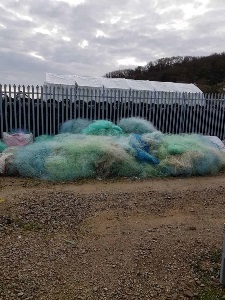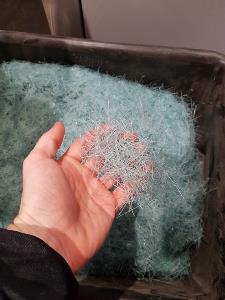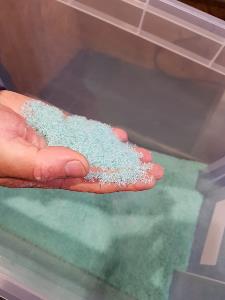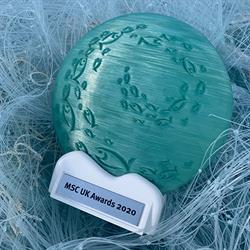Abandoned, lost or discarded fishing gear is a common and significant contributor to plastic pollution in the ocean. Boats can lose control of their fishing gear when it becomes snagged, lost in bad weather or if it is damaged during fishing. Once in the ocean, the plastic monofilament used in fishing gear can take up to 600 years to degrade. When the gear is lost, it can drift through the ocean, entangling and killing marine life - this is known as ghost fishing. Many fisheries go to great lengths to ensure that their gear does not get lost, and once it can no longer be used, ensure it is discarded or recycled properly.
What is the MSC doing about abandoned, lost or discarded fishing gear?
In the MSC Fisheries Standard, the impact of ghost gear or ghost nets is considered in Principle 2: Minimising environmental impact. If a fishery is to be considered best practice according to the MSC Fisheries Standard, they should have knowledge of the scale of gear loss and the impact of this lost gear on habitats, ecosystems or species of concern.We are working with NGOs, fishery managers and scientists to see how we can improve the Fisheries Standard requirements around ghost gear. We want our Standard to reflect the current best practice in management of abandoned, lost or discarded fishing gear, ensuring that other species and habitats within the ecosystem remain healthy. Supporting the prevention of gear loss and ghost fishing is one of 16 topics currently being worked on as part of our Fisheries Standard Review.
Implementation of any changes regarding ghost gear, if confirmed and approved by the MSC Board of Trustees, will take place in the released of the revised MSC standard in 2022.
A British fishery taking action
In addition to minimising gear loss, properly discarding used fishing nets ensures this source of plastic does not end up in the ocean. A number of fisheries in the MSC programme have introduced ways of managing the impact of gear loss or disposal, including the Cornish hake gill net fishery, which first became certified in June 2015. Landing over 1,900 tonnes of hake into Newlyn Harbour last year, the vessels use gillnets with a larger mesh size than the legal requirement in order to allow smaller juveniles to swim free, leaving more fish to reproduce.
The fishery has also adopted an innovative approach for discarding used fishing nets, through a partnership with Fishy Filaments. When degradation or biofilm build-up renders the fishery’s gillnets unusable, the gear is transferred to Fishy Filament’s facility in Newlyn Harbour where they are recycled into engineering grade filament for 3D printing.
A fishery circular economy
Through its unique process of recycling fishing nets to produce a high value nylon filament that can be used in 3D printing, Fishy Filaments is giving this discarded gear a new life. The start-up is exploring different applications for the 3D printing sector.
A team from the University of Exeter recently conducted a study on the carbon cost of recycling the MSC Cornish hake nets into a form that is suitable for injection moulding companies. The findings concluded that the process costs the planet between 97 and 98% less CO2 than if manufacturers employed first use nylon.
The stages of the net through the process



The making of the MSC UK Awards 2020
This year the MSC UK and Ireland team was very proud to have worked with Cornwall-based J Supplied, which specialises in 3D printing, and local artist Charlotte Dawe, to design an award that would pay tribute to the oceans for our MSC UK Awards 2020. 
Using Fishy Filaments’ unique material, the 3D printed design does just that, with a translucency much like the water and a continuous spiral of fish that reflect our shared goal of protecting seafood supplies and keeping our oceans teeming with life. The base is also made out of recycled bottle tops, ensuring the entire design contributes to the circular economy and is a testament to what is possible through innovation and commitment to sustainability.
We’re immensely proud to have showcased the innovation of these trailblazing businesses and artists at our annual Awards, and shine a spotlight on the important efforts being made to help keep our oceans free of plastic pollution.
Watch the making of these innovative awards here.
The 2020 MSC UK Awards


